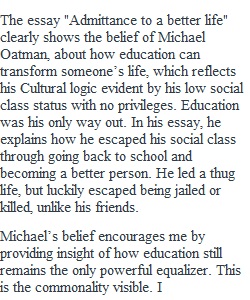


Q For this reflection, we will continue to explore others' experiences as reflected in their This I Believe essays. We'll continue with our discussion of rhetorical listening. Rhetorical listening means that we locate identifications across commonalities and differences. In other words, writers’ experiences and perspectives differ from each other and our own. And, Rhetorical listening means that we analyze claims as well as the "cultural logics" of these claims. Cultural logics are ways of thinking or the guiding principles, values, beliefs, or ideas that people share. Some important points to consider regarding our cultural logics: • o ? Cultural logics are reinforced within communities. For example, they may be reinforced in the books we read and the stories we tell. ? Cultural logics or values are not fixed: they change over time and from place to place. ? We also experience different cultural logics at the same time. This can create conflict or tension within our communities or within ourselves. ________________________________________ For this reflection, then, return to the essay you discussed in the previous reflection. Select several questions from the list below and discuss the differences, commonalities, and cultural logics within that text. (You may need to do online research to answer some of these questions.) • How does this writer's experience differ from what you believe? From what others believe? What “points of tension” do you observe? • How is this writer's experience similar to what I believe? From what others believe? • What cultural logics do you see reflected in the texts that you've read? How are these logics reinforced and shared within communities or groups? o For example, what texts reinforce specific cultural logics? Songs? Oral traditions? Media? o What behaviors, rituals, or events reinforce specific cultural logics? o How are people expected to act when reinforcing specific cultural logics? o How have these logics changed over time? o Do these logics change from place to place? • Do any strategies, remedies, or opportunities exist that promote understanding of these commonalities and differences? At the end of your reflection, fill in the blanks in these sentences: ______'s thesis/main point/argument in the essay is _____. To understand this point, it is important for readers to understand 1) _____ and 2) _____ . ________________________________________ Drafting this reflection. While you might look ahead and review the final assignment requirements, this assignment is a low-stakes opportunity to reflect, brainstorm, ramble, and solicit feedback in 2 - 3 paragraphs and/or 250 words. If you're struggling to develop your discussion, you may find guidance on this page useful: Writing Toolkit: Developing Your Discussions. Would you like to see a model? Here's an example based on Temple Grandin's essay. Rubric Writing Reflection Rubric (1) Writing Reflection Rubric (1) Criteria Ratings Pts This criterion is linked to a Learning OutcomeDevelopment 60 pts Meets Expectations Makes a point about the reading. Interprets or explains that point. Provides an example from both the reading or a source for support. Explains the significance. 0 pts Does Not Meet Expectations Might not a point about the reading. Might not interpret or explain that point. Might not provide an example from both the reading or a source for support. Might not explain the significance. 60 pts This criterion is linked to a Learning OutcomeOrganization 20 pts Meets Expectations Offers a brief introduction/thesis statement. Breaks up large chunks of texts/wall-of-words into paragraphs. Offers a brief sentence bringing to a close. 0 pts Does Not Meet Expectations Might not offer a brief introduction/thesis statement. Might not break up large chunks of texts/wall-of-words into paragraphs. Might not offer a brief sentence bringing to a close. 20 pts This criterion is linked to a Learning OutcomeStyle/Mechanics 20 pts Meets Expectations Offers an appropriate tone for college readers. Is grammatically and mechanically correct. 0 pts Does Not Meet Expectations Might not offer an appropriate tone for college readers. Might not be grammatically and mechanically correct. 20 pts Total Points: 100
View Related Questions